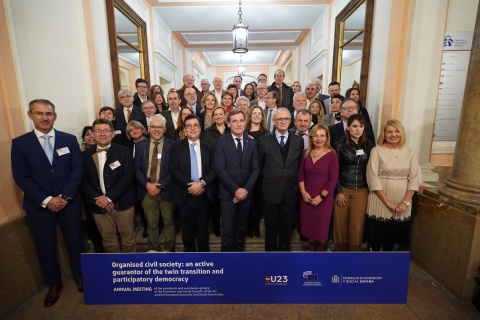European Economic
and Social Committee
European elections 2024 - Civil society must continue to act as watchdog
Ahead of the 2024 European elections, the European Economic and Social Committee (EESC) and the EU's national Economic and Social Councils met in Madrid for their annual meeting. Main takeaway: organised civil society is instrumental in ensuring a just green and digital transition and in making European democracy work.
Organised civil society is and must remain Europe's guardian of participatory democracy, a powerhouse in tackling current and future challenges. At this particular moment in time, the contribution of grassroots organisations is more vital than ever: being active on the ground, they understand what works and what doesn't and they can grasp the impact and consequences of the digital and green transitions on the EU's economy and society.
These are the main highlights of the annual meeting of the presidents and secretaries-general of the EESC and the EU's national Economic and Social Councils (ESCs), hosted by the Spanish Economic and Social Council in Madrid on 16‑17 November 2023.
The conclusions of the meeting stress that a number of recent events such as the COVID-19 pandemic, the multiple economic crises and the unprovoked aggression against Ukraine by Russia have revealed the EU's ability to act in times of urgency.
Mitigation measures to ensure a just transition
Currently, Europe is undergoing the green and digital transition, and its economy and society require significant adjustment efforts to confront these far-reaching changes. The twin transition is creating new jobs in repair activities, renewables and ICT but, at the same time, it is also leading to job losses in some sectors such as fossil-fuel energy and mining.
For this reason, the EESC and the ESCs recommend defining the possibilities for tackling climate change and, in order to ensure a fair transition with a positive impact on the labour market, adopting mitigation measures. Otherwise "No one should be left behind" will remain an empty promise.
The EESC has also encouraged the Member States to set up tripartite "Just Transition Commissions" to allow regional authorities, social partners and civil society organisations to participate in the implementation of the national and regional Just Transition plans.
Participation is key to defending democracy
Likewise, in the last few years, democracy has also faced several challenges to its values and ideals acting as a wake-up call. Overall satisfaction with democracy remains high in Europe. According to recent Eurobarometer surveys, nearly two thirds (64%) of Europeans are satisfied with the EU's work to protect democracy and respect for the rule of law.
However, this feeling is not evenly shared, with major differences among the Member States. This could trigger a certain apathy towards politics in general, a decrease in voter participation and, most worryingly, a deeper distrust of politicians, the State and democracy.
In light of this, the EESC and the ESCs recommend taking action to bring Europeans closer to the political level, for example through new forms of democratic participation, with new functions for the ESCs, or via citizens' panels, as put forward by the Conference on the Future of Europe.
As the EU gears up for the 2024 European Parliament elections, the EESC and the ESCs can make a difference: they inform citizens on the importance of the elections, fight disinformation and gather citizens' concerns and expectations for the new EU policy agenda.
For further information on the annual meeting and the detailed conclusions, please consult the EESC website.
High-level speakers
Europe is facing a new geopolitical context and recovering from multiple crises. Europeans want to increasingly speak up on the future of Europe and we should create a convening space for them. For this, the role of national Economic and Social Councils is key. They can act as hubs for social partners and civil society to help EU citizens voice their concerns and opinions. The EESC and national Councils must work together, especially ahead of the European elections in 2024. Thank you to the Spanish Council as well as the Spanish Presidency for the outstanding work in advancing the EU agenda.
Oliver Röpke, President of the European Economic and Social Committee (EESC)
The world has changed at the beginning of the 20s of the 21st century. We have entered a new era characterised by radical uncertainty. Nobody knows what the most appropriate options will be to face the double digital and green transition. In this scenario, we need more collaborative and interactive governance, in which organised civil society is essential to give legitimacy to policies and guarantee a socially just and environmentally sustainable double transition.
Antón Costas, President of the Economic and Social Council, Spain
Participatory democracy is the main ingredient for strengthening representative democracy as it allows citizens to make their voices heard in between elections. In order to make it stronger across the EU, we need to ensure the knowledge and skills to use a variety of tools and methods, consistency throughout the EU, and impact: effective participatory democracy is based on mutual trust between decision-makers and citizens.
Assya Kavrakova, Executive Director, European Citizen Action Service (ECAS)
